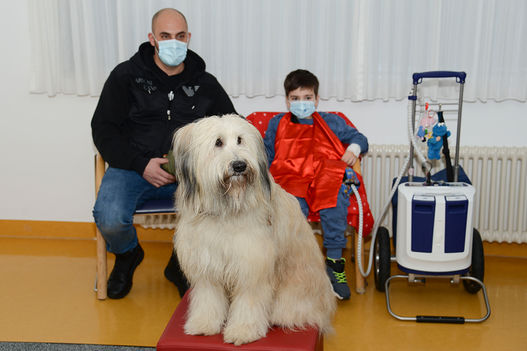Bad Oeynhausen,
This three-year-old, extremely friendly Old German Shetland Sheepdog is called Anna. She and her owner Sabine Krenz have successfully completed a 1-year training course at the European Society for Animal-Assisted Therapy (ESAAT) to become a certified “therapy animal team”. “Animal-assisted therapy involves health-promoting, motivational and rehabilitative measures”, Prof. Dr. Stephan Schubert, Clinic Director at the Pediatric Heart Center and Center for Congenital Heart Defects within the Herz- und Diabeteszentrum NRW (HDZ NRW), Bad Oeynhausen, explains. This kind of concept, exploiting the positive influence of proximity to animals, will be expanded step by step at the Clinic for Pediatric Cardiology, where there is already an aquarium and a turtle house.
Together, Senior Physician Dr. Susanne Grosbüsch, Clinic Psychologist Matthias Lamers, Sabine Krenz, and Professor Schubert planned how best to integrate Anna at the HDZ. This was not easy. But Sabine Krenz and her partner Karlheinz Felgenhauer have worked with children at the Clinic as clowns for many years and so had a wealth of experience and many creative solutions to contribute to the discussion. Of course, dogs cannot simply enter a hospital. As the first and only therapy animal at the HDZ NRW, Anna had to have special permission from the management and the hygiene officer.
Following completion of her training just over a year ago, Anna was soon able to gain some work experience. Her owner, Sabine Krenz, teaches at a special needs school, and Anna has repeatedly accompanied her to work. On her first day at the Pediatric Heart Center, she gets to know young Mikail. He has been at the Clinic in Bad Oeynhausen since last February, and has been waiting for a donor heart for 6 months. At first he is wary of Anna and keeps his distance, while she makes eye contact very slowly and accustoms herself to the noises made by Mikail’s artificial heart.
Anna is patient and very obedient. She is careful to do the right thing and obeys her owner Sabine Krenz at all times. “It is very important for children to develop emotional contact, a relationship, and to follow what Anna does with empathy”, says Sabine Krenz, who always sensitively ensures that her dog also feels happy and not overwhelmed. Dr. Susanne Grosbüsch and Matthias Lamers confirm: “It is not only a case of providing a distraction for children who are sometimes with us for a very long time. An animal appeals to the emotions, and this can make it easier to come to terms with a stay in hospital, which can be difficult, as well as to overcome stress disorders and feel encouraged.” Although Sabine Krenz stresses that she and Anna are not therapists, one thing is clear: once they have got to know one another, Mikail and Anna become friends and a small miracle happens: Mikhail wants to stroke Anna and is already looking forward to her next visit.
Background information:
Animal-assisted therapy (taken in part from Anne Kalisch)
Sabine Krenz sees her work with Anna at the HDZ NRW in the sense of an animal team working as teachers and companions, but not directly as therapists.
There is scientific evidence that children feel particularly drawn to living creatures (biophilia), and that contact to a friendly dog or the presence of a dog has a positive effect. Relevant studies show a triple impact:
Physical impact:
- Lowering of blood pressure and heart rate (calming effect)
- Relaxation of muscles
- Release of the hormone oxytocin
- Reduction of anxiety, stress and depression
Mental impact:
- Promotion of trust, closeness, security, tenderness, comfort, courage
- Increase in self-confidence
- Development of joy and well-being
- Reduction of stress
- Distraction from hospital routines and the effects of disease, improved coping with the disease, positive support during often long stays in hospital
- Encouragement of humor and other positive emotions
Social impact:
- Promotion of communication and interaction
- Socio-emotional interaction with the animal in question (observing, stroking, cooperating, etc.)
- Encouragement to open up and let others in
- Appreciating what it means to feel needed.
Sources:
- Souter, M. A./ Miller, M. D. (2007): Do animal-assisted activities effectively treat 65 depression? A meta-analysis. In: Anthrozoös, Jg. 20, 167–180.
- R Wohlfarth, B Mutschler, A Beetz, F Kreuser, U Korsten-Reck (2013): Dogs motivate obese children for physical activity: key elements of a motivational theory of animal-assisted interventions. In: Frontiers in psychology 4, 796.
- US Army Med Dep J. (2012): Service dog training program for treatment of posttraumatic stress in service members. Apr-Jun:63-9.
Further information:
Herz- und Diabeteszentrum Nordrhein-Westfalen
Universitätsklinik der Ruhr-Universität Bochum
Presse- und Öffentlichkeitsarbeit
Leitung: Anna Reiss
Georgstr. 11
32545 Bad Oeynhausen
Tel. 05731 97-1955
Fax 05731 97-2028
E-Mail: info@hdz-nrw.de

![[Translate to English:] Titel in einem Bühnenelement](/fileadmin/_processed_/2/7/csm_hdznrw_kardiologie-funktionsbereiche_3916a7acfd.jpg)
![[Translate to English:]](/fileadmin/_processed_/3/d/csm_HDZ-ZAH_Ambulanz_Schiff_header_676_ef64147daa.jpg)
![[Translate to English:]](/fileadmin/_processed_/5/c/csm_Blutspendedienst_Header_Unterseiten_3198c81b51.jpg)
